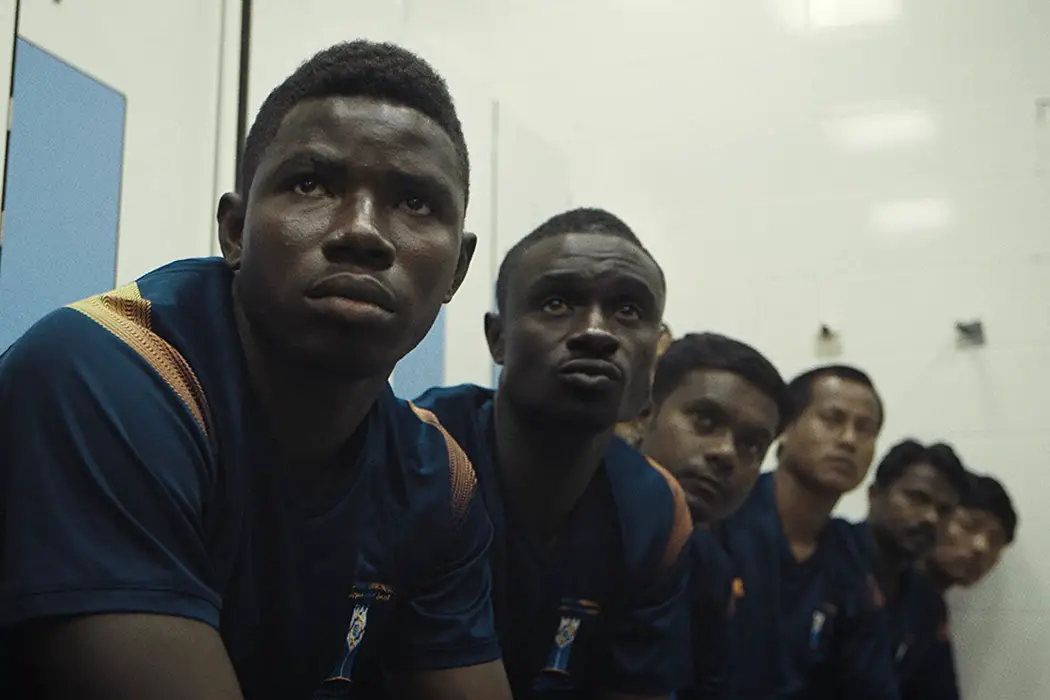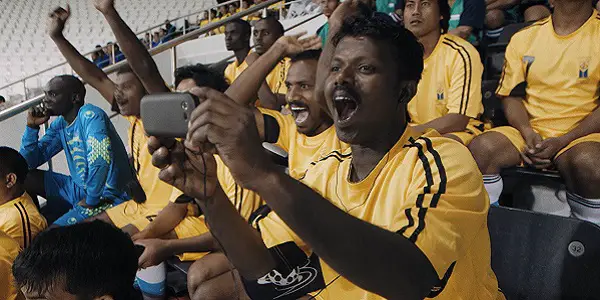THE WORKERS CUP: A Poignant & Painful Look At The Humanity Behind The Spectacle

Lee Jutton has directed short films starring a killer toaster,…
From the moment that the 2022 World Cup was awarded to the tiny, wealthy Gulf nation of Qatar back in December 2010, the tournament has been dogged with suspicions of corruption. Many assumed that the committee that organized Qatar’s bid for the World Cup, the absurdly named Supreme Committee for Delivery & Legacy, bribed voters to award the tournament to an unlikely country that is so hot in the summer that the 2022 World Cup may have to be held in winter instead. Yet there is more concrete evidence out there to argue that Qatar should not be hosting the World Cup in four years, and it can be found in the labor camps clustered on the outskirts of Qatari civilization.
Sixty percent of the population of Qatar is made up of migrant workers who live in these camps, which are by law kept separate from the residential areas of the country. Here, men from countries throughout Africa and Asia work for long hours and little pay to build the infrastructure necessary for Qatar to host one of the world’s biggest sporting tournaments. The situation is rife with human rights abuses, and while a light has certainly been shone on those abuses as preparation for the World Cup progresses, little has been done to improve the lots of the workers.
So, when the Supreme Committee for Delivery & Legacy announces a soccer tournament for the workers, in which 24 construction companies contracting for World Cup bids will each field a team, many of the men in the camps see the tournament as an opportunity for both figurative and literal escape from the seemingly endless drudgery of their days.
Director Adam Sobel’s feature-length documentary The Workers Cup chronicles the journey of one team of workers and shows us how even in the most demeaning of situations, human beings will strive to maintain their dignity. It is the rare film that manages to make your heart feel full while simultaneously breaking it in half.
Theater of Dreams
Sobel and his crew follow a team of workers from a company called GCC. They include Kenneth, a young man from Ghana who dreams of becoming a professional footballer. His agent back in Ghana convinced him to accept a job offer in Qatar; only when he got there did Kenneth realize that he had been hired not to play soccer, but to build facilities for others to play soccer instead.
A strong-willed young man who hasn’t given up on his dreams, Kenneth hopes that he will get spotted by a professional scout during the Workers Cup and receive a contract offer that will enable him to escape the camps. In the meantime, he accepts the role of GCC captain with great purpose and is so serious about winning the tournament that he boldly approaches his bosses about getting more and more time for the team to train.

Kenneth is an incredibly inspiring character who is often a joy to watch, but one cannot ignore the underlying sense of desperation that drives him throughout the tournament.
The other main protagonists of The Workers Cup include Paul, a bartender from Kenya who struggled with the loneliness of the camps – especially the absence of the opposite sex: Umesh, a football fanatic from India who named his sons after Manchester United players and hopes to earn enough money to build them a house; Padam, who is torn between continuing to earn money in the Gulf or returning home to Nepal to be reunited with the wife he has not seen in eight years; and Samuel, a talented goalkeeper who, despite playing in the country’s first division, couldn’t make ends meet playing soccer in Ghana. Each of them suffers from the long hours and isolation inherent in camp life, and each of them approaches the Workers Cup as a way to achieve the kind of glory that has so far escaped them in life.
Off-Field Struggles
The soccer scenes in The Workers Cup are incredibly moving and exciting, with the GCC players celebrating every goal, no matter how awkward or ugly, as though they had just won the real World Cup. Seeing men from a diverse range of countries come together despite cultural differences and racial tension to try and achieve some form of greatness is truly inspiring.
The GCC workers who are not part of the team embrace being fans with just as much enthusiasm, constructing elaborate costumes and creating passionate chants to show their support of their fellow workers. And yet, one cannot overlook the fact that the Workers Cup – as wonderful as it is for the men who are playing in it – was created to serve as a distraction, a public relations shield to hide from the rest of the world how these workers are being treated on an everyday basis in Qatar.

Sobel and his team take us to meet a man whose roommate attacked his leg with a knife just so he could get diagnosed with a mental illness and sent away from the camp. In the camp cafeteria, the men speak of what freedom means to each of them individually. They describe on camera how they were manipulated into accepting long contracts that they now cannot get out of.
One thing is consistent across all of their accounts: life in the camps is miserable, but it is also one of the only options available for people who are kept poor and downtrodden by society. Some of them have done multiple rounds of work in Gulf countries despite the terrible treatment and the separation from their families, because back home, there are no other options.
This issue of severe and cyclical economic inequality is so much bigger than just the 2022 World Cup, but by showing it to us through this specific lens, Sobel and his crew put a personal touch on a global issue that can often feel vague and distant. One can be told over and over again about the labor issues in the Gulf, but it can be easy to push them to the back of your mind when you don’t have a specific situation with which to connect them.
However, when the Workers Cup ends, and these grown men weep and crumble to the ground in the realization that their reason for getting up each morning has now disappeared into the ether, you’ll understand why what is going on in Qatar is so loathsome.

The Workers Cup: Conclusion
Equal parts inspiring and infuriating, The Workers Cup should be required viewing for any soccer fan. As the 2018 World Cup quickly approaches, this film serves as an uncomfortable reminder of the humanity behind one of the world’s most beloved sporting spectacles. Moreover, I cannot fathom how one could see and hear how migrant workers like Kenneth, Umesh, and Padam are being treated and still feel fine with watching the 2022 World Cup in Qatar.
The Workers Cup ensures that you’ll never glory in watching your team lift the trophy in quite the same way ever again.
What do you think? Would seeing a film like The Workers Cup make it harder for you to justify watching the 2022 World Cup? Share your thoughts in the comments below.
The Workers Cup was released in theaters in New York and Los Angeles on June 8, 2018. You can find more screening dates here.
Does content like this matter to you?
Become a Member and support film journalism. Unlock access to all of Film Inquiry`s great articles. Join a community of like-minded readers who are passionate about cinema - get access to our private members Network, give back to independent filmmakers, and more.
Lee Jutton has directed short films starring a killer toaster, a killer Christmas tree, and a not-killer leopard. Her writing has appeared in publications such as Film School Rejects, Bitch: A Feminist Response to Pop Culture, Bitch Flicks, TV Fanatic, and Just Press Play. When not watching, making, or writing about films, she can usually be found on Twitter obsessing over soccer, BTS, and her cat.













